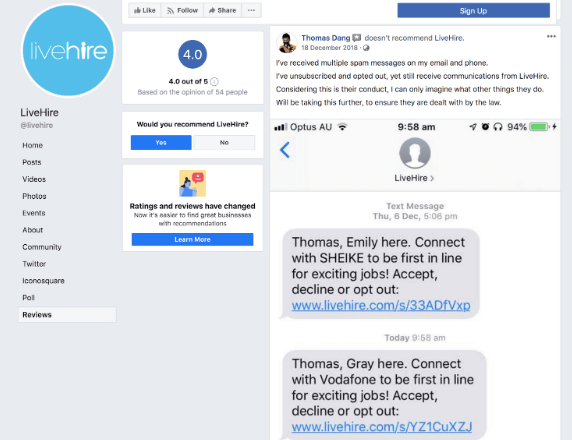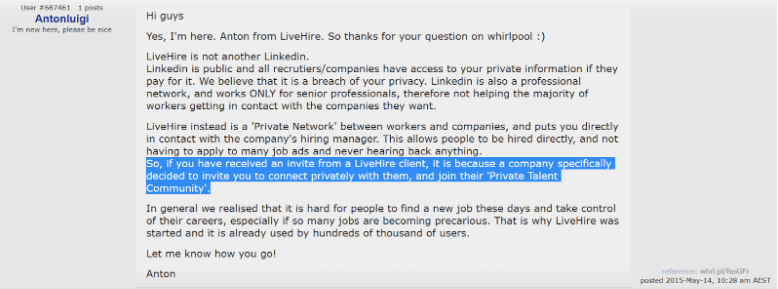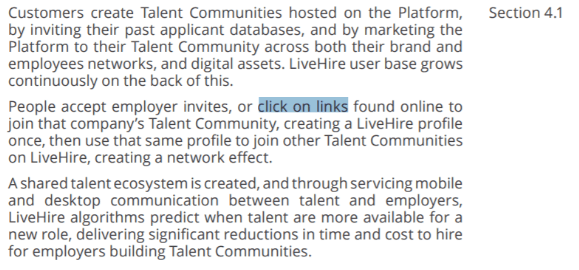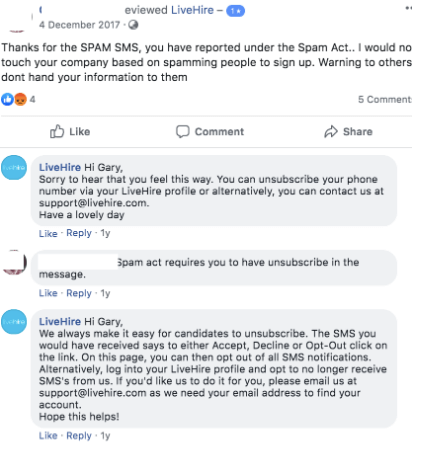Time To Die, Livehire (ASX:LVH)
Livehire (ASX:LVH) is a “talent management technology company” with a market capitalisation of $84 million at the current share price of $0.285. The company has around $35 million in cash which we believe should be returned to shareholders since we believe the business is destined to fail and the business itself is worth nothing, at best.
The Livehire Business Model
We believe Livehire’s core value proposition is to sell companies contact with potential employees. It calls these potential employees ‘talent communities’, but the actual product is simply information about, and access to, those people who make up the ‘talent communities’. Livehire charges its customer about 50 cents per ‘potential employee’ per month, for the right to access information about them, and reach out to them. You can see an example of how this might manifest, from the Livehire Facebook page, below.

Now, the real question here is how Livehire built up its database of potential employees. Indeed, Whirlpool user “Invictus” asked that very question quite some time ago (in 2015).

Perhaps the best answer came from whirlpool user “Antonluigi”, who claims to work for Livehire and happens to share a name with the founder and CEO.

However, while this answer is a lot of fun to read, it doesn’t actually answer the question of how Livehire was able to make the ‘private connection’ to a potential employee, in the first place. In the image below, Daniela from Livehire once explained that a profile is only created once an employee accepts an invitation to join a talent community. But the question remains; how did Livehire get the details of that person which were required to invite them to the talent community in the first place?

Judging from the prospectus, it seems that Livehire makes contact with potential employees ‘on behalf of’ any (client) company to which they had previously applied for a job.

Now, we’re not sure about this, but it seems that once clients have accepted entry into one ‘talent community’, simply by clicking on a link, then their ‘profile’ becomes available for all Livehire’s customers to invite to their own talent community. Now, what sort of information might that profile contain? Let’s look, again, to the prospectus:

We can scarcely believe it's the case, but it seems to us that Livehire has managed to sell access to former applicants back to the very employers they already applied to, for 50 cents per month, all while creating the potential for brand damage for those blue-chip customers (if the posts above are anything to go by).
Questions for Livehire Chairman Mr Michael Rennie
Are all applicants whose information is shared with Livehire by your customers clearly informed that if they agreed to create a Livehire profile, then they would receive personal messages asking them to expose their CVs to other customers of Livehire?
Did they opt-in to receive that contact from Livehire?
Do you check they have opted in or do you simply assume your customers have had them opt in?

Even if your customers such as Tree Of Life and Little Real Estate do pay you $6 per year to access potential employees, how do the economics of this business ever stack up? Why is it worthwhile for customers to pay $6 a year simply to invite 'workers' to apply for jobs?
It’s hard to believe high value employees would willingly be part of this system. What percentage of jobs placed through your talent communities go to employees with a salary over $100,000?
How does this business ever scale? In FY 2018 the company lost over $10 million to achieve revenue growth of around $1 million in FY 2019, during which the company lost over $14 million. With privacy laws only getting tighter, how can you hope to continue to convince employers to provide you with applicants' details?
Under the privacy act, an entity must not collect sensitive information about an individual unless the individual consents to the collection of the information and if the entity is an agency—the information is reasonably necessary for, or directly related to, one or more of the entity’s functions or activities. Does Livehire hold sensitive information within CVs and if so, does it have evidence of express permission to hold that information? Or do you believe that simply assuming that your clients have gained that permission would suffice in this regard?
Livehire often talks about growth in ‘talent community connections’ but how much is your list of potential employees growing, by which we mean the list of email addresses (and or mobile phone numbers) that you can message to invite to join a ‘talent community’?
Finally, would it not be better simply to wind up the company and return what remains of its cash back to shareholders?
Disclosure: the author is neither short Liverhire, nor does he own shares in Livehire .
For occasional exclusive content, join the FREE Ethical Equities Newsletter.
This article does not take into account your individual circumstances and contains general investment advice only (under AFSL 501223). Authorised by Claude Walker.
